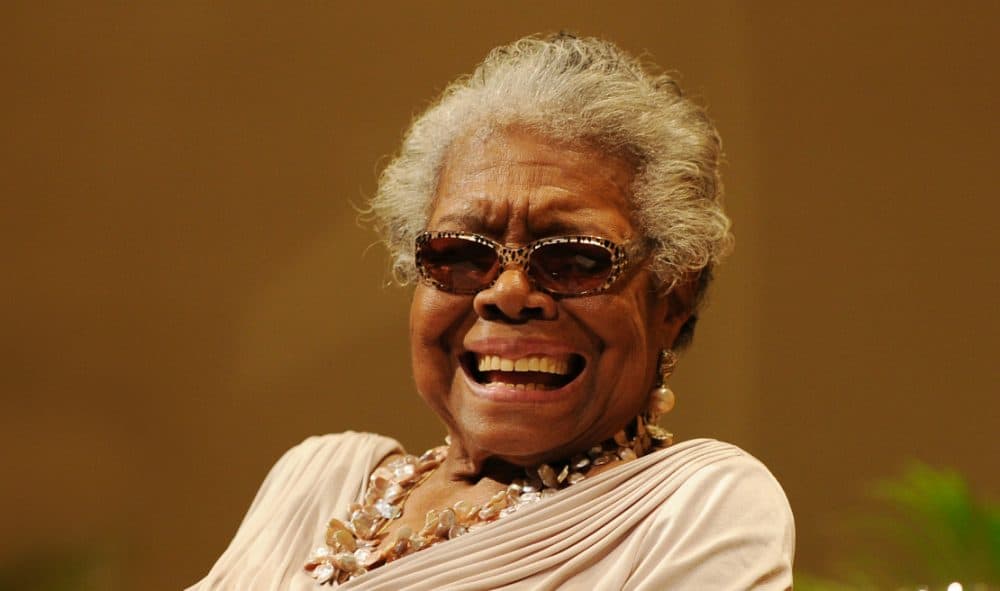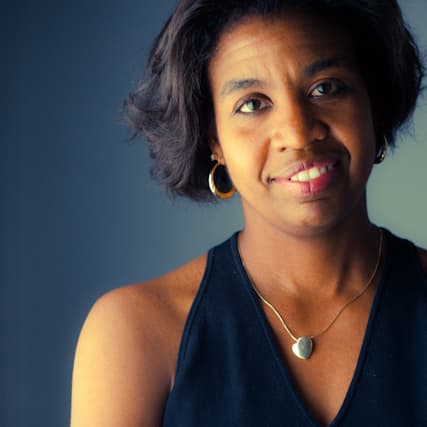Advertisement
A Fellow Poet On The Life And Legacy Of Maya Angelou

The incomparable Maya Angelou died on Wednesday at age 86, and the vibrations of her loss we are just beginning to feel. The Internet is alive with all sorts of remembrances for the award-winning poet, best-selling author and an Emmy and Tony Award-nominated actress. In her last Twitter message, she wrote, “Listen to yourself and in that quietude you might hear the voice of God.” Even in her last few days on Earth, she continued to teach. And in her passing, she offers us a much-needed reminder of the power of words.
Angelou was an iconic figure who possessed an inherent ability to connect with people. She understood the very basic human need for communication. Her words transcended race and class. Some called her writing style simplistic and too accessible, yet it was her accessibility that paved the way for future generations of readers and writers around the globe.
Even in her last few days on Earth, she continued to teach. And in her passing, she offers us a much-needed reminder of the power of words.
Fierce on the page, Angelou was brutally honest, and never shied away from her difficult childhood or the harshness of life. In retrospect, so much of what Angelou achieved seemed symbolic. Her life was about transcendence. Best known for her 1969 autobiography, “I Know Why the Caged Bird Sings,” she shined a flood light on the lives of blacks in the Jim Crow South. Her story was one of race and identity, but ultimately her story was one of resilience. Her six memoirs, which cover her first 40 years, sit handsomely on my bookshelf as a reminder of the power of possibility.
Though I never had the opportunity to hear her speak in person, her loss feels personal. She was a commanding presence on stage and in the public psyche. Well regarded as “America’s conscience,” Angelou was only the second poet to read a poem at a U.S. presidential inauguration. She read for Bill Clinton in 1993 [video below]. The first poet to read at an inauguration was Robert Frost in 1961.
Much is written about Angelou as a poet, storyteller and activist, but she was also a Calypso singer, a director, a street car operator, a college professor and a single mother. Saying Angelou was multifaceted is an understatement. She lived a remarkable life — and was not afraid to use it in her work. Her experiences became the rich soil of her poetry. For many women of color, myself included, her life was testament to equality and justice for all.
In an interview with PBS Newshour this week [video below], poet Elizabeth Alexander said, “What I think was so extraordinary about Maya Angelou’s voice is that it brought together the literary … with the incredible richness of the African American women’s oral tradition.” Alexander is chair of the African American Studies Department at Yale University, and the fourth poet to read at a presidential inauguration (for Barack Obama’s first inauguration in 2009).
We are at a point in history where we are experiencing the passing of a great many artists (Amiri Baraka and Gabriel Garcia Marquez in 2014; Chinua Achebe and Lucille Clifton in recent years). Many of the discussions I've seen on social media have talked about legacy, and the responsibility of this generation of writers — writers of color in particular — to build on those who have come before. How do we take Angelou’s gifts and lessons and create work that examines and broadens the human experience? I come back to this answer: We must continue say the unsayable, to speak the terrible and beautiful truths of our daily lives.
Angelou was friends with Malcom X, Martin Luther King, Jr. and James Baldwin. She valued courage as the most important of the virtues, because, as she said, “… without courage, you can't practice any other virtue consistently. You can practice any virtue erratically, but nothing consistently without courage.”
In a statement on her Website, Oprah Winfrey said this about her friend and mentor for more than 30 years:
Advertisement
“She won three Grammys, spoke six languages and was the second poet in history to recite a poem at a presidential inauguration. But what stands out to me most about Maya Angelou is not what she has done or written or spoken; it‘s how she lived her life. She moved through the world with unshakable calm, confidence and a fierce grace.”
But maybe it is Dr. Angelou herself who says it best. From her iconic poem “Phenomenal Woman”:
Pretty women wonder where my secret lies.
I’m not cute or built to suit a fashion model’s size
But when I start to tell them,
They think I’m telling lies.
I say,
It’s in the reach of my arms,
The span of my hips,
The stride of my step,
The curl of my lips.
I’m a woman
Phenomenally.
Phenomenal woman,
That’s me.
Yes, truly phenomenal.
Related:


